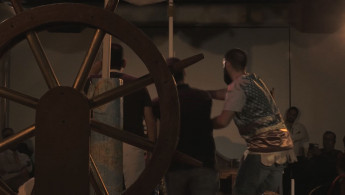Love Boat: Refugees' terrifying tales retold in new play
The play - dubbed Love Boat - introduces six Syrians huddled together on a makeshift vessel as they sail towards a new life in Europe.
The characters, all of whom have their own stories to tell, are each responsible for sharing terrifying tales from the five-year conflict in Syria which has left 270,000 dead and displaced millions of others, triggering the world's worst refugee crisis since the Second World War.
They act under their own names with some personal experiences popping up in the one-act show.
Iman is one of two women involved who plays a teenager hit by shrapnel in the southern province of Daraa - an accident that forced the amputation of her leg. Likewise, the real Iman lost her right leg in the war due to shrapnel wounds.
Haya is a 25-year-old who chose to tell a story of the many Syrian women held captive in regime cells. Her character spent hundreds of days in a jail where she was repeatedly raped. It is a fate that has fallen upon many others.
 |
Haya is a 25-year-old who chose to tell a story of the many Syrian women held captive in regime cells. Her character, like many women in Syria, spent hundreds of days in a jail where she was repeatedly raped |  |
Meanwhile, Mahmud plays Mohammed, a fictional singer who lost a hand, trapped in the Yarmouk Palestinian refugee camp on the outskirts of Damascus, where the actor once lived.
There is also Adnan, who decided to play out his own life story - an activist jailed for simply taking part in anti-government protests.
Upon reaching each European state, the characters quote verses from classical plays written by Aristophanes, Goldoni, Cervantes, Moliere and Shakespeare.
"I wanted through this play to pay tribute to those who have died at sea, those forced to flee their country because of the war and the destruction," director Nawar Bulbul said at the Amman premiere.
"These people boarded makeshift boats to undertake a perilous voyage because of their love of life," said Bulbul.
 |
I wanted through this play to pay tribute to those who have died at sea, those forced to flee their country because of the war and the destruction |  |
Lines from Aristophanes's The Knight are mentioned as they near the Greek coast, while Carlo Goldoni's Servant of Two Masters leads the voyagers to Italy.
Cervantes's Don Quixote alludes to their arrival at the Spanish coast and Moliere's Tartuffe - a piece riddled with religious hints - is quoted upon arrival in France.
The treacherous journey, made by hundreds of thousands of real-life refugees fleeing war and poverty, ends in Greece, where would-be migrants are seen sinking in the depths of the water as lines from Shakespeare's King Lear echo around the stage.
More than 110,000 migrants have crossed the Mediterranean to Greece and Italy so far this year, with hundreds drowning in the process, the International Organisation for Migration said in February.
Last year, 3,770 people lost their lives, including many children, trying to reach Europe.





 Follow the Middle East's top stories in English at The New Arab on Google News
Follow the Middle East's top stories in English at The New Arab on Google News


